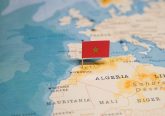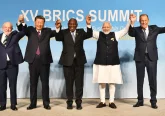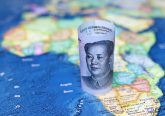‘Resource control is a right. It is not a privilege’
-A member of a peaceful youth rally in the Niger Delta, from the film Sweet Crude.
In the first couple of minutes of the opening of the film, Sweet Crude, director, Sandy Cioffi, discloses, ‘this is not the movie I intended to make’. She had travelled to the Niger Delta to film the building the Niger Delta Friendship Library, which was to serve as a ‘symbol of peace’ in the region. While traveling, visiting and listening to local voices, the true value of this library as an empty symbol was revealed. Sandy says, the ‘reality of their lives are far more complex than a community library. Knowing them would change everything’.
The film explores the impacts of oil on the lives of people and communities in areas of oil production. Cioffi states that the people themselves ‘insisted that we learn about the impact of oil on their lives’. At one point a woman in the film says to a friend, ‘some of the animals we used to have in this bush here we have to describe to our children… we are in trouble… some of the fish we used to have in this river we have to describe to our children’. In fact, the environmental devastation in the Niger Delta makes it one of the most polluted areas in the world. A chilling statistic at the end of the film reveals that there is the equivalent of one Exxon Valdez spill in the Niger Delta every year, for the past 50 years.
The film exposes the complex layers of exploitation and the complicity, on every level, of those in power. Government officials, Shell employees and the co-called ‘international community’ create a complex web of complicity, silence, oppression and exploitation that deprives the peoples of the Niger Delta from reaping any economic or social reward from the enormous resource wealth of their lands. In one interview in the film, a local woman says, ‘[the] environment is the key. They protect their facilities. They put enough security to protect their facilities… then what do the do for us? They give us peanuts and we kill ourselves over the peanuts’.
The death of Ken Saro-Wiwa and eight other Ogoni people (the Ogoni 9) in 1995 illustrates the close relationship between the Nigerian military and Shell Oil. Shell has attempted to say that any corruption was a reflection of local government and politics and that they could not be held accountable. However, we know from leaked documents that Shell paid and encouraged the military to step in to stop popular uprisings against oil exploitation, resulting in the suppression of dissent and deaths of local people. On June 3, 2009, the Second Circuit Court of Appeals overturned the District Court decision dismissing the Wiwa v. Shell plaintiffs’ claims against Shell Nigeria. A few days later, Shell settled with ten million plaintiffs, agreeing to pay $15.5 million.
The case of the Niger Delta can provide insight for neighboring countries who joined the oil production game after Nigeria. In January 2012, a complaint was filed (Plainte des populations et communautés riiveraines de la zone du Projet du Tchad) on behalf of 25,220 people living in the Doba Oil Basin in southern Chad. The controversial Chad-Cameroon Petroleum Pipeline began producing oil in 2003, led by an oil consortium of ExxonMobil, Chevron and Petronas, the World Bank (which withdrew from the project in 2008 after it became clear money from the pipeline was being spent on arms acquisitions in Chad) and the governments of Chad and Cameroon.
According to the complaint filed by local people, the impacts of the pipeline in affected Chadian communities have been
‘Exacerbation of poverty in Chad in general and particularly in the area of the project;
Land pressure and loss of sustainable livelihoods in local communities;
Unrepaired social impacts and damage to individuals and communities;
Irreversible environmental impacts;
Faulty and nonexistent mechanisms that were to supervise, monitor and control environmental and social consequences’
The stories of Chadians and Ogonis (not to mention stories from Angola) can serve as useful parameters as the Kenyan government negotiates the details of an oil pipeline with South Sudan. Ghana has experienced mixed results since oil production began a few years ago, but again, most Africans do not benefit from their country’s oil wealth. Recall again the words of the member of a peaceful youth rally in the Niger Delta, in the film Sweet Crude, who said, ‘Resource control is a right. It is not a privilege’. This provides a more empowering framework for oil production in African countries.
Amber Murrey is a graduate student in the Department of Geography and the Environment at the University of Oxford.








No Comment